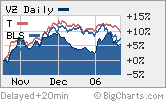|
Video may save the telephone star
For telecoms like Verizon, AT&T and BellSouth, IPTV is the way of the future.
NEW YORK (CNNMoney.com) - For much of 2005, investors had some major hang-ups with stocks of big telecoms and cable companies. Wall Street had soured on the growth prospects for both industries. Then a funny thing happened. Once the top telecoms started acting less like phone companies and more like cablers -- that is, touting their video services -- investors started to put the telecom stocks on speed dial.
Since the last round of earnings reports in mid-October from Baby Bells Verizon (Research), BellSouth (Research) and the new AT&T (Research) (formed from the Oedipal merger of SBC with the old Ma Bell), shares of the three companies have outperformed the broader market, gaining an average of about 10 percent. Wall Street seems to think that the hottest new area of potential future growth for the Bells is not in wireless voice and data but video over the Web: Internet protocol television or IPTV. With cable companies stealing phone company customers with cheap Internet phone plans as well as high-speed Internet access, the Bells have been forced to fight back and Wall Street likes what it sees. Verizon launched FiOS TV, its IPTV service, in select markets last year. And on Tuesday, the company announced that FiOS was now available in Massapequa Park, N.Y., making that the first market in Verizon's home state where FiOS is up and running. AT&T began testing its own IPTV service, dubbed Project Lightspeed, in San Antonio earlier this year. Meanwhile, BellSouth plans on testing an IPTV product sometime later this year. With that in mind, investors will be eager to more about the IPTV plans of the big phone companies when they report their fourth-quarter earnings this week. "The Bells need IPTV. They are losing subscribers to cable," said Greg Gorbatenko, an analyst with Jackson Securities. "It's extremely important for them to trump the offerings of the cable guys and the only way to do that is through video." Video is seen as so crucial to the success of the phone companies that it has even led to some speculation that AT&T may look to eventually buy satellite television firm EchoStar (Research). Fuzzy reception for profit picture
Still, can any of the Bells make money from video? Albert Lin, an analyst with American Technology Research, argues that the phone companies will need between 5 million and 10 million IPTV subscribers before those offerings contribute to earnings. And it will probably take several years to reach those levels, he said. For one, the deployment of IPTV is going to be extremely costly. Building out the networks will require heavy capital spending. Plus, Lin said that phone companies will have to pony up big bucks to media companies to offer their channels. As a result, video isn't going to do much for the Bells in the short-term. All three companies are expected to post sales gains in the low single-digits this year and similarly unimpressive earnings growth for the next few years. Further adding to profit pressure could be pricing of IPTV. When they launched high-speed Internet access, the Bells used discounted pricing to compete with cable companies. They may do the same with IPTV, said Jeff Kagan, an independent telecom analyst. Despite the short-term issues, the telecoms have little choice but to invest in video. "Incrementally, the Bells may never get the return on invested capital. It's expensive," Gorbatenko said. "But it's also preventing customer loss. They have to do it to stay competitive or they'll shrivel down." And Lin said that he thinks telecom investors are actually going to be patient and not fret too much about costs. He thinks that because of the challenges the industry faces, investors are more interested in seeing proof that the Bells can add new customers, as opposed to merely milking existing ones for cash flow. "The vast majority of telecom shareholders want top line growth," said Lin. "For now people want to have some confidence that these companies can grow revenues and subscribers and they'll worry about how much money those new businesses will make later." For more about Cisco's bet on IPTV, click here.
For more about personal technology, click here. |
| |||||||||||||||||||||||||||||||||||||||||||||||||||||||||||||||||||||||||||||||||||||||||


